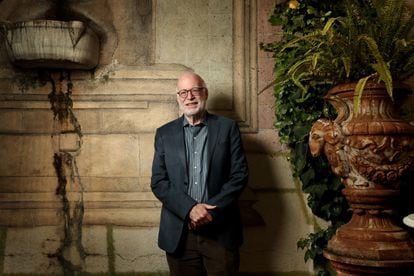The American sociologist Richard Sennett, on May 19, in a hotel in Madrid. Jaime Villanueva
Sociologist Richard Sennett is one of the most farsighted voices when it comes to connecting the analysis of reality with the study of life in cities, climate change, liberalism and multiple disciplines that have led him to disparate books such as
Culture of the new capitalism
(Anagram, 2006),
The decline of the public man
(same editorial, 2011) or
Flesh and stone
(Publishing Alliance, 2019).
Born in Chicago in 1943, he is a professor at the London School of Economics, has been to Columbia University and has been a consultant to the United Nations, where he acknowledges that there were questions for which they never found answers.
Disbelieving in the functioning of the welfare state and the neoliberal evolution of capitalism, he is today focused on the idea of a civil society that recovers collective representation in a business world that has left us isolated.
And before some politicians today worried about acting and not about the problems of the people.
He grants this interview after participating in
Designing Disorder
, a talk at Matadero Madrid and another at the Affordable Housing Activation Forum.
More information
Richard Sennett: "Liberalism has weakened our safety net"
Ask.
Has globalization failed?
Response.
It has failed for the majority, not the elite.
It has not brought many benefits to large masses of the population as promised.
Q.
Is today's inequality the daughter of that globalization?
R.
The pandemic and climate change are showing how unequal the distribution of resources is.
It has always been this way, but we see new forms of inequality.
Millions of vaccines have been thrown away while others had none.
Q.
How should our cities change?
Can we already draw lessons from the pandemic?
R.
The covid-19 has taught us how inflexible our forms of construction are.
The only way to find refuge in the pandemic was in private flats, which ended up being prisons.
If it hadn't been for vaccines, we would have had dead cities.
It has been a kind of bell that has rung to tell us that we need more flexible urban spaces, to reconfigure our houses.
We have super-planned cities that couldn't be reconfigured in the face of unforeseen circumstances.
And climate change is going to be even worse;
it has predictable effects in the long term, but unpredictable in the short term.
We cannot plan when it will be 45 degrees in Madrid, but we must be prepared to reconfigure ourselves in emergencies.
Q.
What does that mean in concrete terms?
A.
We need more open, flexible public spaces: spaces that can be reconfigured.
More spaces, less parking, more trees.
Most of the buildings that are constructed are sealed boxes of glass and steel.
We had thought about simple things like saving electricity, and it turns out that the best thing you can do is open the window to let the air circulate, but in a skyscraper you can't open the window.
With climate change we are going to need flatter, more porous structures, with more possibilities of reacting to nature.
We need open and flexible systems.
In New York we have seen that it is not so much a question of heat as of rain: in periods of drought and flooding, buildings cannot adapt.
I have a wake-up call for architecture in my head.
Q.
Who is doing well?
A.
London is doing some flex houses;
there are many interesting experiments, smaller-scale and adaptable houses.
As a city, Barcelona is doing well, trying to be more flexible.
Some provincial cities like Lyon are doing better than Paris, with this 15-minute city proposal that is a fantasy: if you are poor you have to travel for two hours and you have no choice.
Nordic cities like Stockholm are also wonderful.
P.
With the impoverished middle class, who assumes the role of transformation that it exercised?
R.
I don't know if anyone will take on that role;
One of the effects of neoliberalism has been to weaken this type of collective relations.
Short-term contracts have a corrosive effect, they leave you isolated.
What we need to study is how we can build collective institutions that deal with basic problems like jumping from one job to another and getting a narrative, a story that gives meaning to your career.
That no longer worries any employer.
Amazon is not concerned with the career of its employees but with their pair of hands or answering the phone.
There must be collective institutions, a civil society, and we should be thinking about it.
Not political parties, that doesn't work, we need collective instruments that help that process of having a career beyond being trapped in an adversarial relationship with your company.
The company is hollow in this liberal regime.
It is a matter of social organization.
P.
Are you saying that we can no longer trust the parties for the real needs of the people?
A.
I think not.
If you go to the socialist party and tell them: I've lost my job.
What can you achieve?
[laughs].
Or if you have a two-hour job and you have to leave your son to do it, which is a real problem for people, what are they going to tell you?
Those are the real problems.
P.
Do the parties and governments then no longer think of us?
Isn't it terrible?
R.
It is terrible, yes.
Behind it, however, there is a certain public action that is going to confront this anarchic instability: it happens in poor countries.
In Bombay there are civil groups, neighbors who help, we must learn from those who are in extreme adversity: how to achieve collective standards instead of relying on politics.
The political class is progressively degrading.
The less capable those who get into politics are, the more selfish and narcissistic they are.
Q.
I assume you are thinking of Johnson or Trump.
People vote for them.
R.
Johnson was voted for his fantasy that if he closed the country to immigration things would get better.
And now he is already the most unpopular politician.
Trump represents something very unique related to class and cultural rage.
I hope that we can find a way that these civil institutions that I speak of can help when politics fails.
I am in a labor movement and we have interesting conversations with the churches, the Catholic Church, which I would never go to!
There are institutions that fill these gaps.
And it's wonderful, I don't think it's that dark, we're just going to see a very different society in ten or fifteen years.
P.
Does this mean that the welfare state has failed?
A.
Yes, it is.
It is not providing welfare.
In some places it works, like in the Scandinavian countries.
But this is an ideology and a practice that cannot be aligned with neoliberal capitalism.
It doesn't work that on the one hand you have the right to a pension, but you don't know what you are going to do next month.
Both things do not coexist.
We need welfare, new institutions to make it possible.
Q.
How would you define this era?
Disappointment, resignation, distrust...
R.
It depends on who.
In my generation we never foresaw that the welfare state would be so weak or that there would be such a lack of secure work.
What has been broken is the notion that life is a narrative, a structure.
Perhaps for your children that expectation no longer exists.
And the question is how to build something that lasts and does not waste what they know.
There is a huge loss, a waste of talent when the company only wants and uses what it needs from the person.
Young people cannot become only possessors of a certain capacity.
That is the challenge, there is the temptation to think that everything has gone to hell.
No. The challenge is to find a replacement for that institutional narrative that my generation experienced as something natural and expected.
Sign up for the weekly Ideas newsletter
here .












/cloudfront-eu-central-1.images.arcpublishing.com/prisa/KMEYMJKESBAZBE4MRBAM4TGHIQ.jpg)


